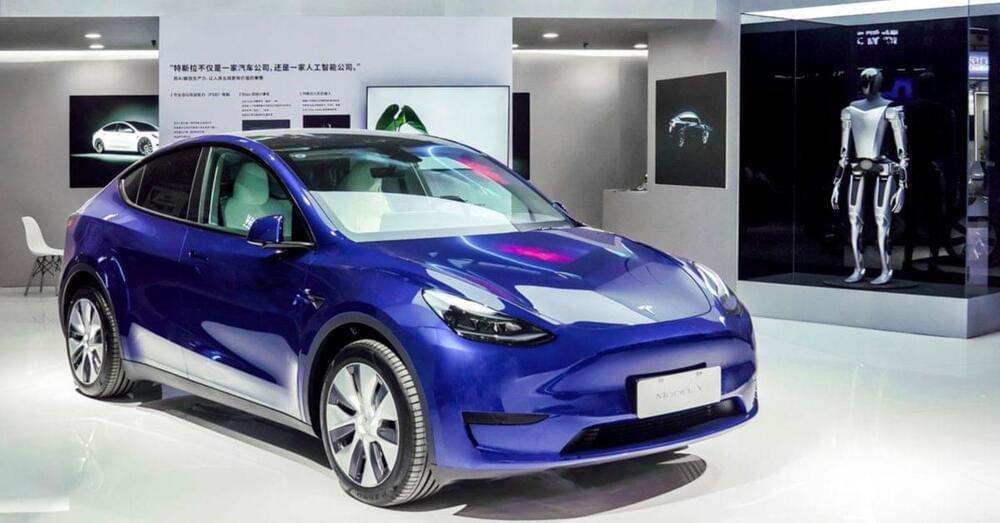A black hole 10 billion light-years away suddenly ‘switched on’, becoming one of the brightest transient objects ever detected.


Engineered Arts, a company that designs, engineers, and manufactures humanoid robots, which is also behind Ameca, has now given Ameca the power to imagine drawings.
In a video released on their YouTube Channel on June 29, 2023, Ameca is being asked to make a drawing of a cat. Previously, Engineered Arts have demonstrated Ameca’s ability to express many different kinds of human emotions and their ability to speak in multiple languages.
Does this mean we might see Ameca’s original works displayed at a museum, like the DALL-E exhibit at bitforms gallery, in the future?

While this is an incredibly ambitious goal and we’re not guaranteed to succeed, we are optimistic that a focused, concerted effort can solve this problem: indent-0 not-italic [em_&]:indent-2] [^problem] There are many ideas that have shown promise in preliminary experiments, we have increasingly useful metrics for progress, and we can use today’s models to study many of these problems empirically.
Ilya Sutskever (cofounder and Chief Scientist of OpenAI) has made this his core research focus, and will be co-leading the team with Jan Leike (Head of Alignment). Joining the team are researchers and engineers from our previous alignment team, as well as researchers from other teams across the company.
We’re also looking for outstanding new researchers and engineers to join this effort. Superintelligence alignment is fundamentally a machine learning problem, and we think great machine learning experts—even if they’re not already working on alignment—will be critical to solving it.
UK company ODIN Space has demonstrated a space junk sensor, which could map and analyse debris with sub-centimetre precision.
SpaceX recently launched a Falcon 9 rocket delivering the Transporter 8 mission, a rideshare carrying various microsatellites and nanosatellites into orbit for commercial and government customers. These payloads included new sensor technology by ODIN Space, installed on a D-Orbit ION satellite. ODIN Space has now confirmed that the spacecraft has successfully begun to capture data from its surroundings.
Dr. Ralph W. Moss and son Ben discuss the science behind the health benefits of chocolate and how this delightful indulgence, often considered a guilty pleasure, can play a vital role in our overall well being.
Program Notes:
For more information on cancer-fighting foods and supplements, please visit our website: https://www.themossreport.com.
5 Defenders Mushroom Blend.
5 Defenders Organic Mushroom Blend Capsules
“A comprehensive self-help plan for cancer includes medicinal mushrooms. They are indispensable”. – Ralph W. Moss, PhD
Mushroom Hot Chocolate with 5 Defenders.
Mushroom Hot Chocolate Mix
5 Defenders Chocolate (seasonal item — October-April)

Throw a stone at any creative product nowadays, and you’ll hit an AI-supported feature. But for Blackmagic Design, AI has already been used for about half a decade under a different name — the DaVinci Resolve Neural Engine.
Their use of AI is impressive but you’d think they’d have good continuous autofocus by now.
I’m going have to split this post into an AI post aswell.

The App Privacy section of Threads’ App Store page lists all the ways in which Threads is tracking you (opens in a new tab) and using your data. Reader, the list is very, very long.
Threads, Meta’s answer to Twitter, launched on Thursday, apparently amassing more than 10 million users in the first seven hours of its existence.
Restoring And Extending The Capabilities Of The Human Brain — Dr. Behnaam Aazhang, Ph.D. — Director, Rice Neuroengineering Initiative, Rice University
Dr. Behnaam Aazhang, Ph.D. (https://aaz.rice.edu/) is the J.S. Abercrombie Professor, Electrical and Computer Engineering, and Director, Rice Neuroengineering Initiative (NEI — https://neuroengineering.rice.edu/), Rice University, where he has broad research interests including signal and data processing, information theory, dynamical systems, and their applications to neuro-engineering, with focus areas in (i) understanding neuronal circuits connectivity and the impact of learning on connectivity, (ii) developing minimally invasive and non-invasive real-time closed-loop stimulation of neuronal systems to mitigate disorders such as epilepsy, Parkinson, depression, obesity, and mild traumatic brain injury, (iii) developing a patient-specific multisite wireless monitoring and pacing system with temporal and spatial precision to restore the healthy function of a diseased heart, and (iv) developing algorithms to detect, predict, and prevent security breaches in cloud computing and storage systems.
Dr. Aazhang received his B.S. (with highest honors), M.S., and Ph.D. degrees in Electrical and Computer Engineering from University of Illinois at Urbana-Champaign in 1981, 1983, and 1986, respectively. From 1981 to 1985, he was a Research Assistant in the Coordinated Science Laboratory, University of Illinois. In August 1985, he joined the faculty of Rice University. From 2006 till 2014, he held an Academy of Finland Distinguished Visiting Professorship appointment (FiDiPro) at the University of Oulu, Oulu, Finland.
Dr. Aazhang is a Fellow of IEEE and AAAS, and a distinguished lecturer of IEEE Communication Society.
Dr. Aazhang received an Honorary Doctorate degree from the University of Oulu, Finland (the highest honor that the university can bestow) in 2017 and IEEE ComSoc CTTC Outstanding Service Award “For innovative leadership that elevated the success of the Communication Theory Workshop” in 2016. He is a recipient of 2004 IEEE Communication Society’s Stephen O. Rice best paper award for a paper with A. Sendonaris and E. Erkip. In addition, Sendonaris, Erkip, and Aazhang received IEEE Communication Society’s 2013 Advances in Communication Award for the same paper. He has been listed in the Thomson-ISI Highly Cited Researchers and has been keynote and plenary speaker of several conferences.

Tesla is planning to use its Optimus robot, also known as Tesla Bot, in its stores in an attempt to help sales, but not necessarily how you think.
We are not talking about robots taking care of customers walking into the stores, or at least not just yet.
Sources familiar with the matter told Electrek that Tesla has been experimenting with using Optimus humanoid robot display units inside its stores in China.

Almost half of the tap water in the US is contaminated with chemicals known as “forever chemicals,” according to a new study from the US Geological Survey.
The number of people drinking contaminated water may be even higher than what the study found, however, because the researchers weren’t able to test for all of these per-and polyfluorinated alkyl substances, or PFAS, chemicals that are considered dangerous to human health. There are more than 12,000 types of PFAS, according to the National Institutes of Health, but this study looked at only 32 of the compounds.